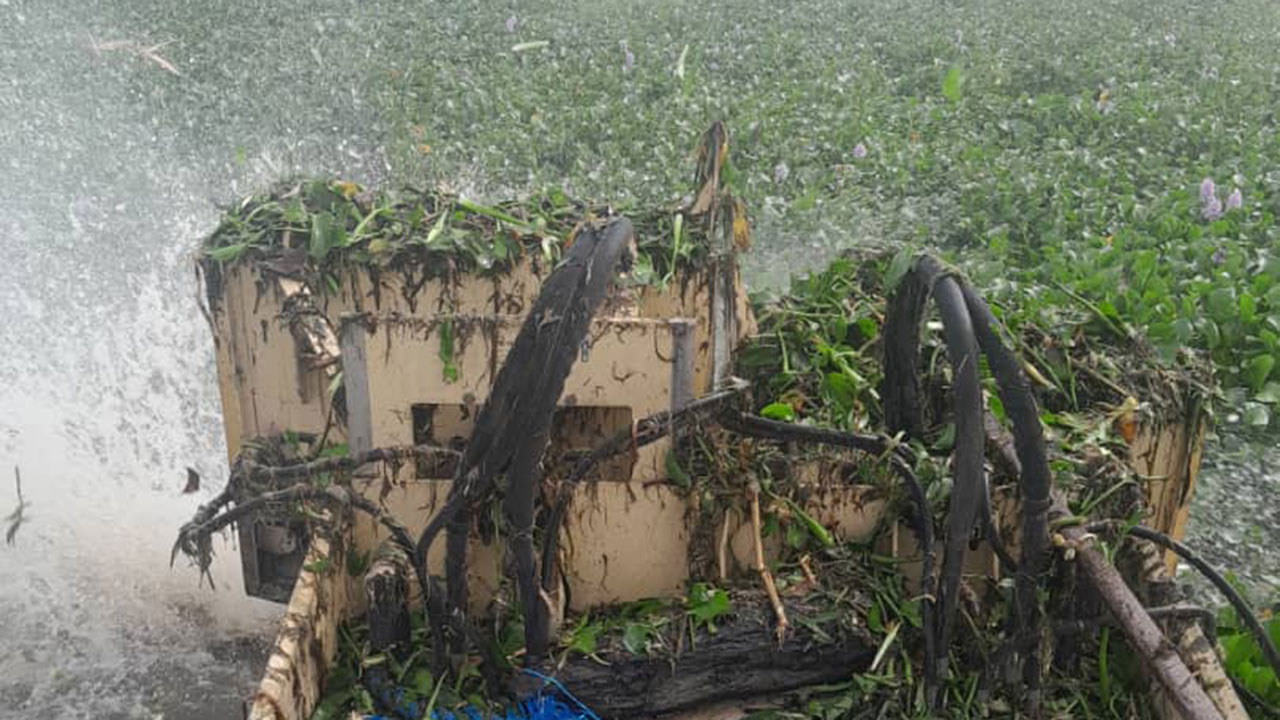
The heavy presence of water hyacinth on Lagos waterways has defied the Federal Government’s investment in making the state’s waters navigable for boat operators.
The strange rebound of the weed has continued to pose threats to water transportation causing breakdown of boat engines and mishaps, which has forced the National Inland Waterways Authority (NIWA) and the Lagos State Waterways Authority (LASWA) to close boat operations at the Ikorodu jetty.
Federal Government had in 2018 and 2019 specifically allocated N2.28 billion for the clearing of water hyacinths, floating debris and wastes at Oworonshoki waters, Ijegun waterfronts, Port NoVo Creek, Oyingbo to Agbara waters, Ebute Ipakodo creek, Ikorodu and Epe waterfronts in Lagos as well as for the supply of multi-purpose water hyacinth equipment.
NIWA had last month deployed its massive swamp devil machines to attack and clear pervasive water hyacinth vegetation, which has clogged navigable water channels in Ebute areas of Ikorodu.
Water hyacinth weeds rear up their fangs from October to late December every year, a natural phenomenon that impedes boating activities and aggressively disrupts fishing activities on inland waterways across the country.
The Lagos Area Manager of NIWA, Dr. Sarat Braimah said the agency had mapped out strategic plans to tackle the menace with a special team on detailed lookout for the mystery weeds, to help arrest their impact before they overrun the navigable channels in the state.
One month later, the gravity of the weeds overwhelmed and defied the team’s effort to check its menace, which forced the authority to suspend all boat operations to and from the Ikorodu ferry terminal to avoid possible breakdowns of boat engines and mishaps.
The suspension of boat operations followed a boat mishap that would have claimed the lives of passengers on a fully loaded LAGFERRY boat after it got stuck by water hyacinth for hours.
To also prevent further mishaps, LASWA ordered the closure of operations at the Ikorodu jetty, with indications that other jetties in the state may be forced to close down following the rapid growth of water hyacinth across the waterways.
During a visit to some ferry terminals recently, boat operators in those areas struggled to navigate their route owing to the rising presence of water hyacinth.
Marina and Apapa jetties specifically have a heavy presence of water hyacinth across the waterways, even as boat users have urged both the Federal and state governments to come to their aid to avoid boat mishaps caused by the weeds.
In response to the stoppage of usage of Ikorodu jetty, registered boat operators are now compelled to relocate their activities to Majidun until a safe channel is identified and approved by NIWA.
This move caused by the suspension of the jetty, according to the Chairman of the Association of Tourist Boat Operators and Water Transporters of Nigeria (ATBOWATON) Ikorodu chapter, Olusoji Majofodun, has cost operators N2.3 million daily losses.
Majofodun confirmed that water hyacinth has been a hazard for boat operators every year, particularly from July to September and October, when it blocks the entrance of the Ikorodu Ferry terminal.
He said the operators find it very difficult to navigate the channel, as some of the boats spend over an hour trying to navigate the water hyacinth every year.
“ We expect that by now they would have found a means of eradicating this water hyacinth. The one that came this year came in a large quantity and made access to the terminal very difficult.
“Another challenge is that where we are supposed to use 50 litres of fuel for transportation, we spend double navigating through the water hyacinth, which also causes overheating of our engine and sometimes totally blocks the engine and damages it,” he lamented.
Acknowledging the challenges posed by the water hyacinth influx, LASWA, in a press statement issued over the weekend, said it has taken decisive action to minimise the impact on commuters.
LASWA said it has opened the Ibeshe Jetty and Majidun landing as alternative routes for ferry transportation, explaining that the persistent aquatic plant has significantly impeded the seamless navigation of ferries along specific routes, thereby affecting the efficiency and reliability of water transportation in the region.
The General Manager of LASWA, Mr. Oluwadamilola Emmanuel, while emphasising the authority’s commitment to the safety and efficiency of water transportation in Lagos State, said it is actively addressing the root causes of the water hyacinth influx, collaborating with relevant environmental agencies for long-term solutions.
Despite the substantial budgetary allocations, the persistent water hyacinth challenge raises concerns about the effective utilisation of funds and the need for a more comprehensive and sustainable approach to address this ecological hindrance on Lagos waters.



